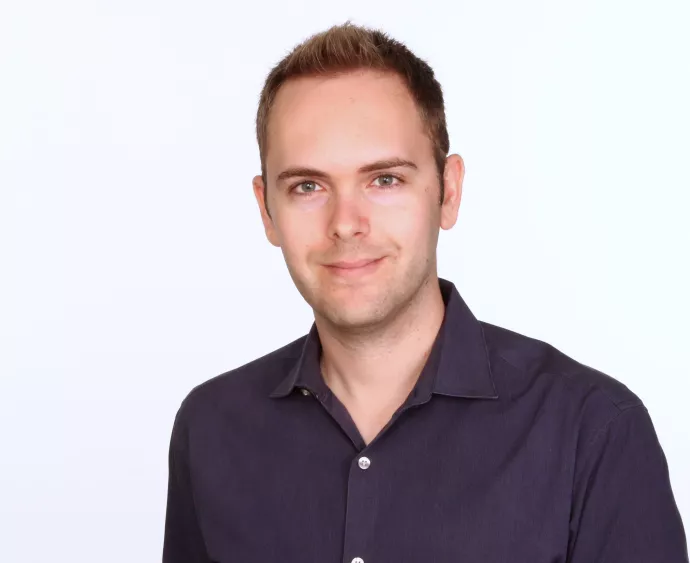
In pursuit of truth: Daniel Dale delivers 2019 Snider Lecture
Daniel Dale is a truth seeker. A fact-checker. A journalist who after 11 years at the Toronto Star has made the leap to his latest position as a reporter on CNN. He's also this year's Snider Lecturer, a series that started in 1974 with the goal to enrich UTM's intellectual and cultural life and present voices that make people think about the world around them.
Dale started his lecture by meditating on a pivotal moment in his career, a moment in his early reporting for the Toronto Star of former Toronto mayor Rob Ford. "One of the first times I used the word ‘lying’ in print was after the mayor of Toronto chased me around the park, threatening to punch me, called the cops, and then strongly suggested that I was a pedophile," recalls Dale.
Dale responded by writing a column headlined "Rob Ford is lying about me and it's vile" and also initiated a lawsuit against Ford which resulted in the mayor apologizing and retracting his statements. If there was an upside to the incident, it was that it deepened his thinking, and prompted him to invent the "campaign lie detector" to in the 2014 election, an early fact-checking foray.
Dale goes to Washington
Following a move to the Star's Washington bureau, things got even more interesting: Donald Trump was elected. As Dale begin to cover U.S. politics, he noticed not only were the untruths rampant, but trivial. He recalls one example on the campaign trail with Trump in Michigan where the now-president declared he'd been named Michigan man of the year. Upon fact-check, it turned out that no such title exists.
Dale had had enough. "To me, truth is not a sideshow. It's the show," said Dale, using the analogy that if a stranger in a bar said 20 false things that we would all highlight that in telling our friends afterwards. "So why wasn't it the first thing that we as journalists are telling our readers or viewers?"
In September 2016, Dale took action, making a list of dubious things Trump had said that day, sharing it on Twitter. After repeating this a few times, another career-changing moment: documentary filmmaker Michael Moore retweeted his list, shaming U.S. media for not doing as good a job as this Canadian reporter. Not only did it skyrocket his Twitter following, but it moved Dale to another realization: "Omigod, I have to do it every day." And with a couple of breaks for vacation and transition to CNN, that’s what he’s done.
Joining CNN and the battle for facts
Calling the experience of being at CNN "surreal" (he recalls an afternoon when anchor Wolf Blitzer came through pushing an ice cream cart at breaktime), Dale says he's impressed by the fact that the station maintains a fact-checking team with two dedicated reporters. "Very few media outlets are treating fact-checking like a daily endeavour, and I think we need to, because we're in the middle of a full-blown truth crisis with Donald Trump,” he says.
With that, he shared some of his own tenets of a truth-centric model of political journalism, which included flagging false claims (by politicians or otherwise) even as they are reporting them, pursuing repeated false claims (he notes that Trump has restated some claims dozens if not hundreds of times), and making fact-checking an everyday pursuit rather than one reserved for election debates.
While Dale says even he gets depressed about the battle for facts (he’s counted 6000 false claims from Trump; some outlets report even higher), one of the best things a journalist can do is to rebuild eroding trust in the media. “It's important for journalists to stand up for facts regardless of how many people, how many voters, want them. What is the job of a journalist in a democracy if not to provide accurate information to whoever wants it?”
He also says ordinary citizens have a role to play, including making sure that we’ve read an article before sharing it (sometimes the headlines can be different from the body), limiting sharing to trusted sources, and doing our quick fact check if a headline seems too sensational. Finally, reach out to friends and family members if we see them sharing something untrue, something that he admits “is not always pleasant or easy”.
While Dale’s talk concluded with a range of questions on topics from objective truth to media fragmentation to the challenges of artificial intelligence technology, perhaps it’s appropriate here to end with a final Dale analogy on dealing with the truth crisis at hand. “I think we need to treat misinformation like a health virus. You can try to deal with it after misinformation spreads, but it's much better if you can interrupt the transmission, act aggressively at the outset to try to prevent the spread," says Dale.
